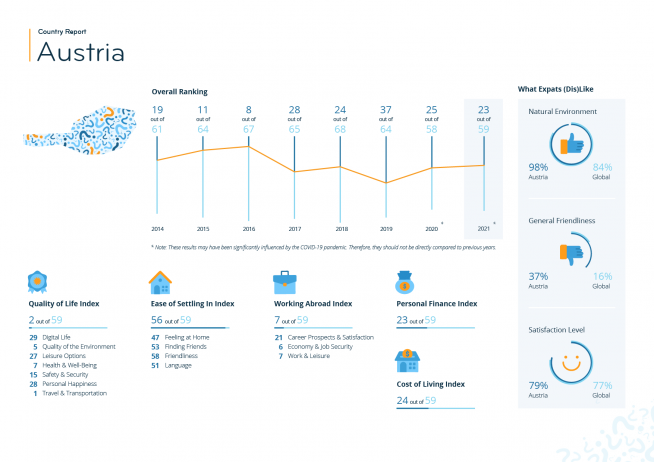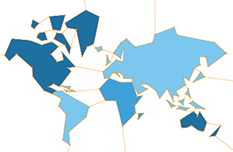Austria: Amazing for Travel but Terrible for Settling In
Top Findings
- Austria ranks 2nd worldwide in the Quality of Life Index, only beaten by Taiwan.
- However, Austria is 4th from the bottom in the Ease of Settling In Index.
- 82% of expats are satisfied with the affordability of healthcare in Austria (vs. 61% globally).
- 86% of respondents rate the state of the Austrian economy positively (vs. 62% globally).
- 76% of expats in Austria say that COVID-19 has had no effect on their stay abroad (vs. 63% globally).
The Second-Best Destination for Quality of Life
Coming in 23rd place out of 59 destinations, Austria ranks second worldwide in the Quality of Life Index, only beaten by Taiwan. It even ranks first in the Travel & Transportation subcategory: 95% of expats are happy with their travel opportunities (vs. 84% globally), and 94% rate the transportation infrastructure positively (vs. 76% globally). Nearly all expats in Austria are also happy with the natural environment (98% vs. 84% globally), as well as the water and sanitation infrastructure (97% vs. 77% globally). The country does very well in the Health & Well-Being subcategory (7th), with 82% rating the affordability of healthcare positively (vs. 61% globally) and 88% being satisfied with the quality of medical care (vs. 71% globally). A Turkish expat shares that she particularly likes the “general life quality, air, water, transportation, and healthcare”. There is only one downside in terms of the quality of life: 17% of expats find it difficult to pay without cash in Austria (vs. 9% globally), which places the country in the bottom 10 for this factor (50th).
Expats Struggle to Make Friends
Austria also lands in the bottom 10 for the Ease of Settling In Index (56th) — only Denmark (57th), Japan (58th), and Kuwait (59th) perform worse. Exactly three in ten expats (30%) do not feel at home in the local culture (vs. 20% globally), and 54% do not find it easy to make local friends (vs. 36% globally). Moreover, 37% of respondents rate the general friendliness of the population negatively (vs. 16% globally). A British expats shares: “People are polite, but it's very difficult to make real friends with locals.” Not being able to connect with the local residents is not necessarily due to the language barrier: only 8% of respondents do not speak the local language at all (vs. 13% globally), while 30% speak it a little and another 56% speak it fairly or even very well.
People are polite, but it's very difficult to make real friends with locals.
A Good Work-Life Balance & Stable Economy
On the upside, working in Austria pays off for expats: the country lands in the top 10 of the Working Abroad Index (7th), with three-quarters of respondents (75%) rating their working hours positively (vs. 66% globally). Another 73% are happy with their work-life balance (vs. 66% globally), and 86% rate the state of the local economy positively (vs. 62% globally). “The work culture here rewards real talent,” says an Indian expat. And a British expat shares: “I like the Austrian attitude towards work and free time. There is a balance, and working is not stressful — everyone has time for a break!” Lastly, Austria’s above-average performance is also reflected in the Personal Finance (23rd) and Cost of Living (24th) Indices, with 56% rating the local cost of living positively (vs. 48% globally).
I like the Austrian attitude towards work and free time.
The Impact of COVID-19 on Expat Life
The pandemic seems to have had less of an impact on expats in Austria compared to the global average: more than three-quarters of respondents (76%) say that COVID-19 has had no effect on their stay abroad (vs. 63% globally). Altogether, just 24% of expats in Austria have had to change their plans for the future (vs. 37% globally). However, more than one out of three respondents in Austria (34%) say their social life is suffering the most, ten percentage points more than the global average (24%).
For expats in Austria, the top 3 sources of information regarding COVID-19 and related regulations are local news (57%), official government channels (54%), and social media (38%). More than seven in ten expats (71%) are happy with the official communication on the pandemic (vs. 66% globally).




